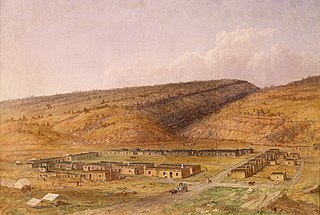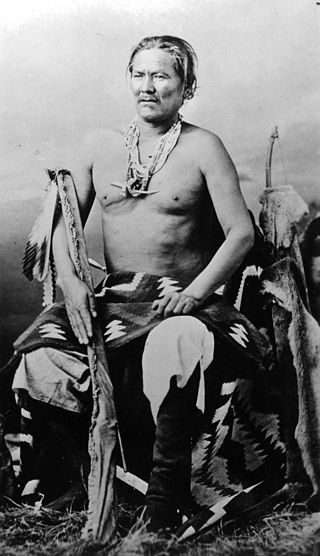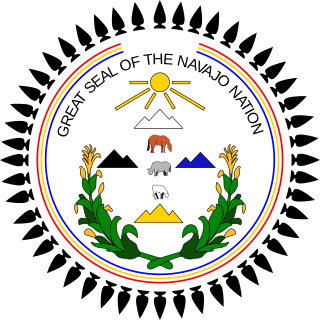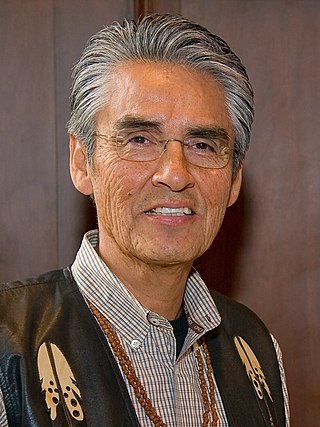Related Research Articles

Fort Defiance is a census-designated place (CDP) in Apache County, Arizona, United States. It is also located within the Navajo Nation. The population was 3,624 at the 2010 census.

Kayenta is a U.S. town which is part of the Navajo Nation and is in Navajo County, Arizona, United States. Established November 13, 1986, the Kayenta Township is unique in being the only "township" existing under the laws of the Navajo Nation.

The Navajo Nation, also known as Navajoland, is an Indian reservation of Navajo people in the United States. It occupies portions of northeastern Arizona, northwestern New Mexico, and southeastern Utah. The seat of government is located in Window Rock, Arizona.
Northland Pioneer College (NPC) is a public community college serving the communities of northeastern Arizona. Campuses are located in four of the largest Navajo County communities: Holbrook, Show Low, Snowflake, and Winslow. Five centers are located in Hopi/Polacca, Kayenta, Springerville, St. Johns, and Whiteriver. NPC also partners with community members in Apache County, Arizona.

Annie Dodge Wauneka was an influential member of the Navajo Nation as member of the Navajo Nation Council. As a member and three term head of the council's Health and Welfare Committee, she worked to improve the health and education of the Navajo. Wauneka is widely known for her countless efforts to improve health on the Navajo Nation, focusing mostly on the eradication of tuberculosis within her nation. She also authored a dictionary, in which translated English medical terms into the Navajo language. She was awarded the Presidential Medal of Freedom in 1963 by Lyndon B. Johnson as well as the Indian Council Fire Achievement Award and the Navajo Medal of Honor. She also received an honorary doctorate in Humanities from the University of New Mexico. In 2000, Wauneka was inducted into the National Women's Hall of Fame.

Chief Manuelito or Hastiin Chʼil Haajiní was one of the principal headmen of the Diné people before, during and after the Long Walk Period. Manuelito is the diminutive form of the name Manuel, the Iberian variant of the name Immanuel; Manuelito translates to Little Immanuel. He was born to the Bit'ahnii or ″Folded Arms People Clan″, near the Bears Ears in southeastern Utah about 1818. As many Navajo, he was known by different names depending upon context. He was Ashkii Diyinii, Dahaana Baadaané, Hastiin Ch'ilhaajinii and as Nabááh Jiłtʼaa to other Diné, and non-Navajo nicknamed him "Bullet Hole".
Peabody Energy mined coal at the Black Mesa plateau in the southwestern United States from the 1960s until 2019. The plateau overlaps the Navajo and Hopi reservations.

The Navajo Nation Council is the Legislative Branch of the Navajo Nation government. The council meets four times per year, with additional special sessions, at the Navajo Nation Council Chamber, which is in Window Rock, Arizona.

The Navajo or Diné, are a Native American people of the Southwestern United States.

Joe Shirley Jr. is a Navajo politician who is the only two-term President of the Navajo Nation. He served as president from 2003 to 2011. He lives in Chinle, Arizona, and is Tódíchʼíiʼnii, born for Tábąąhá.

Peterson Zah was an American politician who held several offices with the Navajo Nation. From 1983 to 1987, he was chairman of the Navajo Nation, its then head of government. At its 1991 restructuring, he became the first president of the Navajo Nation, until 1995. He then worked at Arizona State University as special adviser to the president on American Indian Affairs from 1995 to 2011 and consulted companies willing to work with his nation.
Rezball, short for "reservation ball," is a style of basketball associated with Native Americans, particularly at the high school level in the Southwestern United States, where many of the Indian reservations were created in the country.
Albert A. Hale was an American attorney and politician. A member of the Democratic Party, he served in the Arizona Senate from 2004 to 2011 and in the Arizona House of Representatives from 2011 to 2017.
Frank Tsosie Thompson was an American Navajo code talker in the United States Marines during World War II.
The Navajo Nation presidential election of 2010 was held on Tuesday, November 2, 2010. Ben Shelly won the election.

Ben Shelly was the 7th president of the Navajo Nation. He was the first president to have been elected both president and vice president of the Navajo Nation, as well as the first New Mexican Navajo to hold the Navajo presidency.

The Bureau of Indian Education (BIE), headquartered in the Main Interior Building in Washington, D.C., and formerly known as the Office of Indian Education Programs (OIEP), is a division of the U.S. Department of the Interior under the Assistant Secretary for Indian Affairs. It is responsible for the line direction and management of all BIE education functions, including the formation of policies and procedures, the supervision of all program activities, and the approval of the expenditure of funds appropriated for BIE education functions.
Jennifer D. Benally is a former state representative from Arizona, representing the 7th district. A member of the Democratic Party, Benally was first elected to the Arizona House of Representatives in 2015. Benally did not seek reelection in 2016.
Claudeen Bates Arthur was a Native American lawyer who was the first Navajo woman licensed as a lawyer in the United States and the first female Chief Justice of the Supreme Court of the Navajo Nation.
The Navajo Transit System (NTS) is a public transportation system that serves and operates on the Navajo Nation. The system currently operates 17 routes throughout the Navajo Nation and within Arizona, New Mexico and Utah. The system provides service to 41 of the 110 Navajo Chapter communities.
References
- 1 2 3 4 5 6 7 8 9 "Retired Navajo Nation district judge dies". Albuquerque Journal. Associated Press. 2013-05-24. Retrieved 2013-06-19.
- 1 2 3 4 5 Kane, Jenny (2013-05-24). "Navajo Nation's 'Mother of Justice' dies". The Daily Times (Farmington) . Archived from the original on 2013-06-23. Retrieved 2013-06-19.
- ↑ "Navajo President Joe Shirley Jr. sworn in to second term, Navajo Vice President Ben Shelly takes his oath of office" (PDF). Government of the Navajo Nation . 2007-01-10. Archived from the original (PDF) on 2014-07-14. Retrieved 2013-06-19.